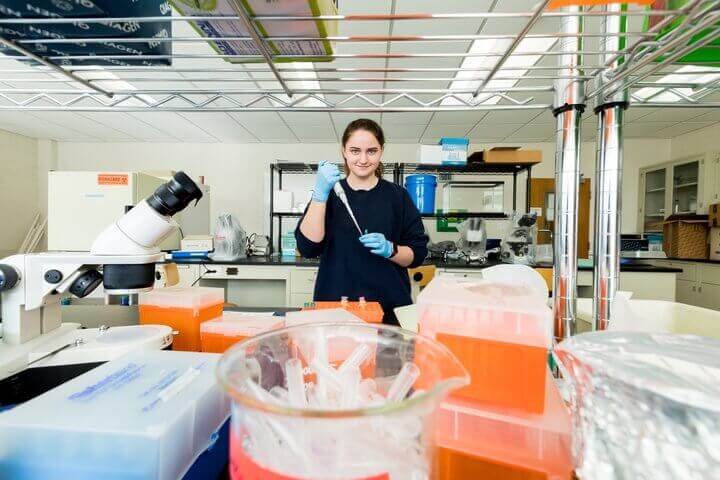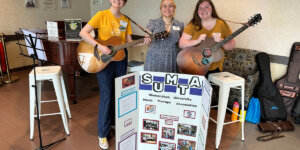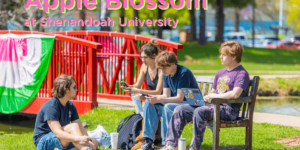Shenandoah University freshman Teresa Zielinski ’21, an environmental studies major with a minor in biology, recently received a $5,000 grant from the Virginia Native Plant Society to support research aimed at saving American chestnut trees. Courtesy of the grant, she will take part in research on the subject this summer alongside Assistant Professor of Biology, Laurel Rodgers, Ph.D.
Zielinski, surprised by the award, said, “honestly, I did not expect to get it at all.” She feared the odds were against her due to her freshman status and her first application for a grant.
Dr. Rodgers said she is proud of Zielinski’s accomplishment and excited for her to join the team. “Research money is always highly competitive, and whether you are a graduate student or a full-fledged research professor, it’s not easy to get.
You have to write a very well-constructed grant that outlines the importance in your research, how that ties into the bigger picture, and lay out an argument as to why this research is more important than any other research that they are funding.
“It takes a lot of experience to be able to put together that kind of story,” Rodgers said. “That’s a skill that many juniors and seniors aren’t even ready for yet. It’s a big deal.” She added, “It isn’t every day a freshman can add a grant to her curriculum vitae.”
Their research will attempt to find a way to preserve American chestnut trees, which were almost completely wiped out back in the early 1900s when diseased Chinese chestnut trees were imported to America.
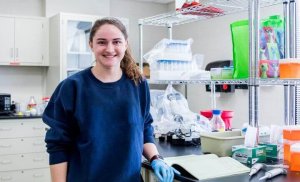 “Our research is going to be on endophytes, which are fungi that live on trees naturally,” said Zielinski.“We are going to be identifying three types, the Chinese chestnut tree, the original American chestnut tree, and the hybrid between the two, to see if there are any [endophytes] in common living on them that might indicate which [endophytes] are more common and that might [provide] immunity.”
“Our research is going to be on endophytes, which are fungi that live on trees naturally,” said Zielinski.“We are going to be identifying three types, the Chinese chestnut tree, the original American chestnut tree, and the hybrid between the two, to see if there are any [endophytes] in common living on them that might indicate which [endophytes] are more common and that might [provide] immunity.”
Dr. Rodgers added to this saying, “we could test whether endophytes growing on trees resistant to C. parasitica (the cause of Chestnut blight) are contributing to their resistance.”
The Virginia Native Plant Society, which awarded the grant, is a nonprofit organization, established in 1982. Its goal is to preserve the wildlife and native plants of Virginia.
In preparation for the summer research, Zielinski has been working with senior Biology student Dillon Richardson ’18 in the lab. Richardson worked with Dr. Rodgers on her research in the past and is helping Zielinski learn what she will need to know for the summer research.
“Essentially he is training her in the techniques that we are going to have to use,” Dr. Rodgers said. “We are going to be pulling small pieces, plugs of bark out of the trees and then growing out all of the fungi inside of them, and then use DNA sequencing to identify the species so that we know which fungi we have in the trees. What he is doing is teaching her how to isolate DNA, how to sequence it and analyze it, and to do all of the lab methods, so that when we start working in June, she’s already practiced the methods that we are going to use, and we’ve kind of gotten over the learning curve and can jump in quickly with the research.
Zielinski said she looks forward to gaining experience that most freshmen don’t have the opportunity to receive.
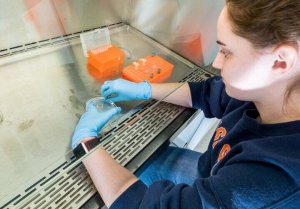 “It is pretty exciting that I get to learn a lot of stuff as a freshman where it will help me in later classes. Where a lot of people are learning it for the first time, I will already have experience doing it. It will definitely help with getting internships because I will already have hands-on experience.”
“It is pretty exciting that I get to learn a lot of stuff as a freshman where it will help me in later classes. Where a lot of people are learning it for the first time, I will already have experience doing it. It will definitely help with getting internships because I will already have hands-on experience.”
And Zielinski is ready for the research phase to start.
“It’s a little overwhelming but I am excited to do it. It’s something new,” she said. “I would like to thank Dr. Rodgers for getting me involved. I didn’t know if my major was correct for me. It was just a really rough adjustment period for me and for her to take me in on something and take a chance, I thought was really great.”
By Rachel Deanne Sherman ’18
